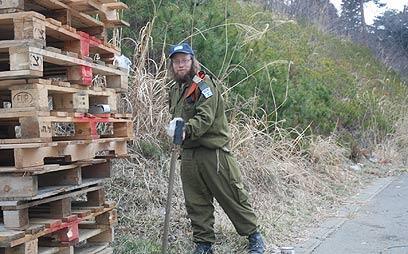When Tzvi Yehuda Mansbach took his officers course and became an Israel Defense Forces rabbi, he never imagined that one day he would be providing religious services for dozens of soldiers at the ends of the earth. But then the earth shook and Mansbach, the Home Front Command's Central District rabbi left his office in Zrifin and got on a plane – destination: Japan.
Early last week he arrived in the city of Minamisanriku with the IDF's aid delegation andsince then he's busy dealing with issues like kashruth, prayers, tefilin, Shabbat and Passover.
Talking to Ynet from the ruins of the Miyagi District city just before his first Shabbat with the delegation, Lieutenant Rabbi Mansbach first offers words of calming assurance: "The locals won't feel any difference between our activities on Shabbat and during the week."
According to Mansbach, the Halacha allows the Israeli forces to break the Shabbat laws in order to save lives – even if those involved aren't Jewish and from that perspective, the IDF is in operational activity mode just as if the soldiers were in Israel carrying out operational activities.
Officer, rabbi, medic - Rabbi Mansbach (Photo: IDF Spokesman)
"Of course you break the Shabbat laws to save non-Jews", he goes on to quote the Halacha which states that in order to keep the peace – the laws can be broken to save lives. "This is for the benefit of strengthening relations with Japan, participating with them in their time of need and showing solidarity with the Japanese people."
The rabbi says that you can't but be astonished at the scope and power of the disaster – "a whole city was just erased, there aren't even ruins" – yet even when chaos reigns, he doesn't ignore the need for an 'Eruv' (enables the carrying of objects out of doors on the Jewish Sabbath). Last Wednesday Mansbach was hard at work constructing the partitions, poles and lengths of string that would allow the Israeli team to carry objects throughout the area during Shabbat.
'Mission comes first'
He then had an eight hour trip to look forward to – to the closest kosher bakery (and back) to buy challah for Shabbat. So what did the team have to look forward to for Shabbat? The 60 delegation members, half of which were medical teams, were told where they could carry objects and equipment, supplied with a special Shabbat meal and allocated time to get ready for the holy day.
The rabbi from Home Front Command never forgets that the mission which took them to the Japanese city is the most important thing and so there will be no adherence to IDF 'Shabbat proceedings' that are usually implemented in IDF courses and training.
Mansbach shows true esprit de corps towards his 'place of origin' stating: "The IDF rabbinate does, as its wont, everything – at any time, in every place. The mission comes first, and the mission is above everything."
True to the new path being set by IDF rabbis, the role he took upon himself doesn't end with offering limited religious services to the 10 religious members of the delegation but also encompasses providing spiritual support to the delegation members – religious and secular in the complex reality they are required to work in.
Yet it isn't just the Israeli delegation that the IDF rabbinate representative has been made responsible for – he is also taking the distressed local community under his wing. Since the aid mission hasn't been given a time limit, it has made arrangements for a lengthy stay in Japan and brought 'Seder kits' for each soldier.
The IDF also took Tokyo's Jewish community, who will most likely find it hard to provide themselves with matzos, wine and Passover Haggadahs for the holiday, into consideration and loaded the plane with additional kits – for the locals.
Amazing setup
"It is a great privilege to be on the first aid delegation in the world to fly into Japan" Lieutenant Mansbach concluded as he praised his friends" "If we were in Israel we would need at least 200 people for what just 60 are doing here. The setup is amazing."
To his concerned friends and family he sent a calming message: "We are over 62 miles away from the nuclear plants. We have a radiation safety expert on the team and the monitoring results are not very different from those we get in Israel."
The clinic established by the Israeli team includes x-ray facilities, a lab, pharmacy and intensive care unit as well as children's clinics, surgery, orthopedics, obstetrics, gynecology, nose ear and throat specialists and ophthalmology departments.


